
Gastroscopy
Why do people have a gastroscopy?
Gastroscopy is the definitive investigation for many conditions of the stomach, oesophagus and duodenum, having the advantage over other techniques in that biopsies may be taken. The most common reasons for Gastroscopy are:
- To investigate reflux or dyspepsia symptoms
- To investigate abdominal pains, nausea or vomiting
- To investigate swallowing problems
- To investigate for possible coeliac disease
- Iron deficiency anaemia (a decrease in blood count due to loss of iron)
- A family history of gastric or oesophageal cancer
- A personal history of Barrett’s Oesophagus.
At your Specialist clinic appointment you will have the opportunity to discuss the procedure in person as well as plan the date and receive the necessary paperwork to arrange your procedure.
You will need to complete an admission form and submit this to Chelsea as well as paperwork that may be required for your insurance provider. Note that we are Southern Cross Preferred Providers which streamlines approval for those members.
Gastroscopy is usually performed under sedation. You will need to fast prior to surgery in preparation. A minimum of six hours fasting is required though clear fluids can be taken for up to two hours before your procedure.
Gastroscopy is performed as a day procedure at Chelsea Hospital. After completing your admission details and changing into theatre attire an IV line will be inserted into your hand or arm and monitors will be attached to ensure your safety during the procedure.
A numbing spray will be administered to your throat then strong sedation medication will be administered through the IV line and the procedure will begin.
The gastroscope is passed from your mouth all the way to the duodenum. Air is pumped into your colon to allow visualisation. Biopsies may be taken, which is painless.
After the gastroscopy you will be observed in a recovery area, usually for about 30-60 minutes until the effects of the sedative medication wear off. The most common complaint after gastroscopy is feeling bloated and gas cramps. By belching gas you will make yourself more comfortable and speed up your recovery. You may also feel groggy from the sedation medications. Most people are able to eat and drink normally after the test.
It is normal to feel tired after gastroscopy under sedation and you should plan to take it easy and relax for the rest of the day. As you have received strong sedative medication it is important you do not drive vehicles, operate machinery, engage in high risk activities, drink alcohol or make important decisions until the following day. You should stay in the company of a responsible adult.
Gastroscopy is a safe procedure, and complications are rare but can occur, as follows:
- Bleeding can occur from biopsies or the removal of polyps, but it is usually minimal and can be controlled.
- The gastroscope can cause a tear or hole in the oesophagus, stomach or intestine. This is a very rare though serious complication
- It is possible to get a chest infection or even pneumonia by contents from your stomach being inhaled into your lungs
- It is possible to have side effects from the sedative medicines.
You will be told preliminary information from the procedure once you have woken from the sedation. Biopsies generally take one to two weeks for results to return. If you require follow-up, an appointment will be arranged for you before you leave.
Seek urgent medical attention if you develop any of the following within 24 hours of your procedure:
- Severe chest or abdominal pain
- Breathing difficulties
- Vomiting blood
- Black bowel motions
- Fever
- Weakness or dizziness
